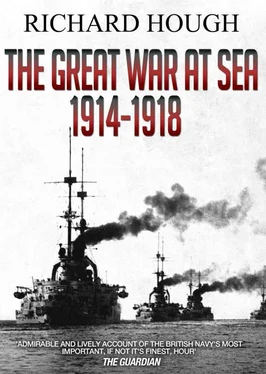Richard Hough
THE GREAT WAR AT SEA
1914-1918
To the memory of Arthur Marder
Following the publication of his third volume of ‘Jacky’ Fisher’s letters in 1959, Professor Arthur Marder suggested that I should write a biography of his hero, and gave me much assistance and advice when I agreed to do so. Then, sometime before his untimely death on Christmas Day 1980, he and the Oxford University Press approached me with the suggestion that I should embark on a one-volume history of the Royal Navy 1914-18. In this proposed new work I was to have additionally the bonus of access to all Marder’s papers and, of special value, the papers he had accumulated since the publication of the five volumes of From the Dreadnought to Scapa Flow . On his death this material was all in characteristic Marder order in preparation for further revised and expanded editions of his own work.
Arthur Marder and I had been friends and mutual critical admirers since the late 1950s. I was never so professionally stimulated as when with him, either in England or southern California. In Marder’s company, ‘shop’ ruled everything, and I can recall with some embarrassment a private dinner at the Garrick Club during which, at opposite ends of the table, we found ourselves overwhelming all other conversation and rearranging the cutlery in a prolonged Jutland debate. We did not agree on all matters, nor all judgements, but that only added a spice to our relationship.
In the last months of his life he asked me to read and comment upon the manuscript of his last great work, Old Friends , New Enemies ; and in his last letter to me written a few days before he died he wrote warmly about my biography of our mutual friend, Lord Mountbatten. I was able to talk to Marder, all too briefly, about my preparatory work for this book. I most earnestly hope that he would have approved of it in this final form. I know that he would have been gratified that I had the continuous and invaluable advice of Lieutenant-Commander Peter Kemp, who proved himself Marder’s own ‘ready and constant counsellor’ for so many years, and to whom I, too, owe a great deal over twenty-five years of writing naval history.
RICHARD HOUGH
The influence of the German Emperor – Britain’s new alliances – Admiral Fisher appointed First Sea Lord – The need for naval reforms – The conception of the Dreadnought, and her critics
An onlooker described the launch of HMS Dreadnought as ‘the greatest sight I have ever seen – it made me proud of my country and of the Navy’. ‘She went in without a hitch,’ a naval cadet wrote home, ‘She is an enormous ship.’ (1)
The battleship was launched by Edward VII at Portsmouth on a chill, dour day in February 1906. The King sang ‘For those in peril on the sea’ as ardently as anyone present. He was afterwards presented with an oak casket, carved from Nelson’s flagship, HMS Victory . It contained the mallet and chisel used in simulation to sever Dreadnought’s last cable securing her to the slip.
The first Dreadnought had been built in 1573 and fought against the Spanish Armada, the sixth distinguished herself at Trafalgar. This was the ninth ship in the Royal Navy to carry the name, and her historical associations were as numerous as her innovations. Almost every feature of this battleship was notable and novel. As those who had been chiefly responsible for her proudly proclaimed, the Dreadnought was to be the biggest, fastest, and most heavily gunned battleship in the world. She was also to be heavily armoured and protected from fatal damage by elaborate compartmentation. For the first time in a battleship, the Dreadnought was to be driven by efficient and clean turbines in place of reciprocating engines.
This battleship, floating high out of the waters of Portsmouth harbour, flags taut in the breeze, and, to the sound of music and cheers, being nursed towards her fitting-out basin by paddle tugs, was to lend her name to every subsequent capital ship built for the world’s navies. Even the Germans, the future enemy who built almost as many as the British, called them Dreadnoughtschiffe . It was a breed of fighting ship that in its size and grace and provocative appearance celebrated appropriately the last generation of the big-gun man o’war. The Dreadnought , built at unprecedented speed and at once making every other battleship of the world outdated, became a political and material factor in the naval arms race already under way between Britain and Germany. ‘Germany has been paralysed by the Dreadnought’ , Admiral Sir John Fisher, First Sea Lord, wrote gloatingly and with every word underlined, to King Edward VII. Germany was dismayed, even outraged, but not paralysed for long. Ten years later Germany could put to sea a fleet of twenty-one dreadnought battleships and battle-cruisers in the greatest naval battle in the war: a war which the dreadnought and the competition she intensified, had in large measure brought about.
Fifteen years earlier Germany had possessed a negligible navy of small coast-defence vessels, and though the Germans were powerful on land, the sea was not an element that had previously inspired their interest or ambition. For Britain the Pax Britannica had been sustained since Trafalgar and the Napoleonic wars by a Navy which incontestably ‘ruled the waves’, boasting a numerical strength greater than that of any likely combination of navies afloat. The strength and quality of the Royal Navy were as unquestioned by the mass of the people as those of God and Queen Victoria. Everyone gave ‘…three cheers and one cheer more, for the hardy Captain of the Pinafore ,’ and ‘the ruler of the Queen’s Navee’ would still have been an object of veneration even if Gilbert and Sullivan had not kept the nation humming. The Diamond Jubilee review of the fleet in 1897 was described by the The Times as ‘this unexampled scene… Nothing could be more impressive than the long lines of ships anchored in perfect order, spreading over miles of water in apparently endless array.’
The Navy’s influence and presence were world-wide. From the rivers of China to the Navy’s coaling station in the Falkland Islands, from Newfoundland to Simon’s Town in South Africa, and from Malta to Wellington, New Zealand, the white ensign flew and gunboats or second-class protected cruisers, battleships, or torpedo boats, were available for any occasion, ceremonial or unruly.
Sir Walter Raleigh at the time of an earlier great queen had written that ‘There are two ways in which England may be afflicted. The one by invasion… the other by impeachment of our Trades.’ Few English people read Raleigh in the 1890s, and even fewer bothered to define or comprehend the meaning of the maritime supremacy the nation enjoyed. This task became the responsibility of an obscure American naval captain, Alfred Thayer Mahan, who wrote several works of history on the influence of sea power. (2)These were read with wonder and admiration in Britain, and alerted many people to the importance of retaining the superiority they had taken for granted for almost a century. If her Trades were impeached, Britain’s industry would be silenced, her people starved.
Mahan’s work was timely. In those final decades of the nineteenth century the colonial appetite of other nations was growing apace, and with it an interest in trade and the sea upon which it depended. Mahan was read in Washington and Berlin, Tokyo and Paris, and a consciousness of the value of naval strength spread through the defence councils of nations which would benefit from it, as well as many others concerned with prestige and power over their neighbours.
Читать дальше












